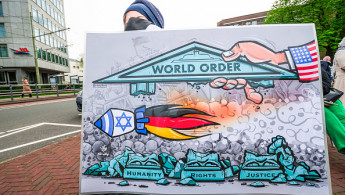Israel's security 'at core' of Berlin foreign policy: Germany at ICJ
Israel's security is at the "core" of German foreign policy, the UN's highest court heard on Tuesday, where Berlin is defending itself against a claim that it is furnishing Israel with weapons being used in Gaza.
"Our history is the reason why Israel's security has been at the core of Germany foreign policy," Germany's representative told the International Court of Justice in The Hague.
"Where Germany has provided support to Israel, including in a form of export of arms and other military equipment, the quality and purposes of these supplies have been grossly distorted by Nicaragua," Tania von Uslar-Gleichen said.
Nicaragua has brought Germany before the International Court of Justice (ICJ) to demand that judges impose emergency measures to stop Berlin from providing Israel with weapons and other assistance.
Lawyers for Nicaragua argued that Germany is in breach of the 1948 United Nations Genocide Convention, set up in the wake of the Holocaust, by furnishing Israel with weapons.
On Monday, Nicaragua's lawyers called Berlin "pathetic" for supplying Israel with weapons and at the same time giving humanitarian aid to Palestinians
Nicaragua asked the ICJ to decide "provisional measures", the emergency orders that can be imposed while the court considers the broader case.
Germany had already said after Monday's hearing that it "completely rejected" Managua's accusations.
The ICJ was set up to rule in disputes between nations and has become a key player in the Gaza war.
In a separate case, South Africa has accused Israel of perpetrating genocide in the Gaza Strip, charges Israel has angrily denied.
In that case, the court ordered Israel to do everything in its power to prevent genocidal acts and recently toughened its stance, ordering additional measures obliging Israel to step up access to humanitarian aid.
The court's rulings are binding but it lacks an enforcement mechanism. For example it has ordered Russia to stop its invasion of Ukraine, to no avail.
Israel's bloodiest ever war on Gaza has killed over 33,200 people in the course of six months, most of them women and children, and has laid ruins to much of the territory. The siege of Gaza has also left people starving.
The Hamas-led October 7 incursion into southern Israel sparked the conflict, when its attack left around 1,170 Israelis dead, according to an AFP tally based on official Israeli figures.
The Palestinian group also took around 250 hostages, about 130 of whom remain in Gaza. Hamas says its attack came was in retaliation to Israel's decades-old aggression against the Palestinian people and its 16-year blockade of the Gaza Strip.





 Follow the Middle East's top stories in English at The New Arab on Google News
Follow the Middle East's top stories in English at The New Arab on Google News


